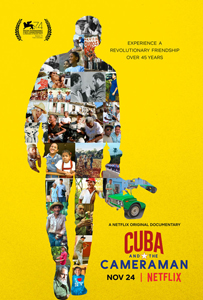Cuba and the Cameraman (2017)—Cuba

In the early 1970's the photojournalist Jon Alpert took a first generation "video camera" onto the streets of New York City to document social issues like sweat shops and failing schools. He then had an epiphany: "We heard that Fidel Castro was implementing the social programs that we were fighting for here in New York,” like free health care, housing, and education for all. And so he took his camera to Cuba, which is a mere 44-minute plane ride from the US mainland. This delightful film is the result of some 1,000 hours of video footage that he took across 45 years of returning to Cuba to "try to tell its story." This isn't a film of political analysis. Rather, it's a deeply personal film about his love affair with that island nation, its socialist project, and its many contradictions and complexities. The film begins and ends with the death of the "Eternal Commander" Fidel Castro (1926–2016), whom Alpert interviewed numerous times (including one on Fidel's 90th birthday just before he died). The real focus of the film, though, is on three ordinary families, and what they thought and experienced across the 45 years that Alpert kept returning to check in with them. Was Cuba a socialist paradise or what JFK called "a police state?" Well, you can find both. The collapse of the Soviet Union in 1990 meant the end of $8 billion a day in subsidies, empty grocery stores, blackouts, long gas lines, shuttered factories, an emergent black market, and, eventually, a sort of capitalist-driven tourist industry in which former engineers and doctors sold souvenirs at street markets. But when the "Maximum Leader" died in 2016, as his film footage shows, thousands of people still thronged the streets and wept openly at Fidel's funeral procession. I watched this film on Netflix.
Dan Clendenin: dan@journeywithjesus.net


